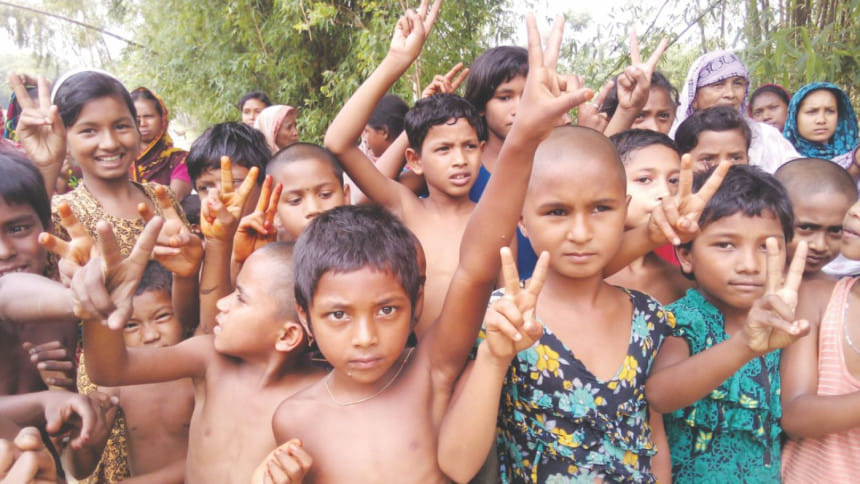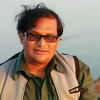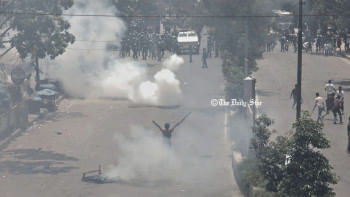People of enclaves to gain access to state services

"We face difficulty in almost every sphere of life in the enclave. Although situated in Bangladesh, ours is an Indian enclave. We don't have access to any kind of state facilities, and our children cannot go to school and there are no health facilities," said Noor Hossain, an elderly inhabitant of Latamarienclave in Sree Rampur union at Patgramupazila. "After 68 years of sorrow, we are finally going to be Bangladeshi nationalsand we are very happy," he added. Like Noor Hossain, many other inhabitants of the enclave explained their miserable experience of confined living in the enclaves. An enclave is any portion of a country that is entirely surrounded by the territory of a different country.
People in enclaves along the bordering areas of India and Bangladesh found them literally in the middle of nowhere in 1947, as the Indian subcontinent got divided into two countries, leaving them virtually 'stateless.' The people of enclaves blamed the Indian government's indifference for prolonged miseries of the people living in 111 Indian enclaves in four northern districts of Bangladesh.They said the 'invisible borderline' demarcated with some pillars installed during the 1947 partition had kept them away from all government facilities including health and education and forced them to lead an inhumane life.
Neither the governments of India nor of Pakistan (prior to 1971) had recognized the residents of the landlocked areas as their citizens and therefore they were deprived of all basic rights of a citizen, said a number of enclave dwellers, who had seen both the British and the Pakistani regimes before Bangladesh was liberated from Pakistan in 1971.The enclave dwellers said that none of them were eager to move to India."The issue of the enclaves has long been hanging in the balance. The people living in the enclaves have been deprived of citizenship and other civic facilities for the last 68 years.We had a united world until it was divided into Hindustan and Pakistan. I can remember the pillars that divided us from Pakistan and from India,' said Samad Miah, 90, an inhabitant of Indian enclave Bhotbari, situated in Bangladesh's Islampur village of Patgramupazila.He said that all those living in the enclave in a three km radius from Patgramupazila headquarters had suffered a lot due to poverty and none had come to help them.
Shamsul Islam, an inhabitant of Indian enclave Bashkata is situated in Bangladesh's Jongra union of Patgramupazila said, "What the people of enclave want is nationality and access to state facilities. We were happy over the latest development in the process for exchanging 162 enclaves between Bangladesh and India under the land boundary agreement signed back in 1974," he said. The people will now have the right to stay where they are, as nationals of the state to which the areas are transferred.Mainul Islam, President of Indo-Bangla Enclave Exchange Coordination Committee said that Indian LokSabha, lower house of parliament, unanimously passed a bill seeking amendment to the constitution to implement the historic Indira-Mujib pact to facilitate the exchange of the enclaves, transfer of adversely possessed areas and demarcation of 6.5km of unmarked border lands between the two neighbours. Bangladesh ratified the pact on November 27, 1974 after the two countries had signed it on May 16, 1974 for demarcation of the 4,156 km land boundaries, he said.
A total of 51 Bangladeshi enclaves, 18 of Kurigram and 33 of Lalmonirhat, are located in Cooch Behar district of West Bengal and out of 111 Indian enclaves, 12 are situated in Kurigram, 59 in Lalmonirhat, four in Nilphamari and 36 in Panchagarh of Bangladesh.Under the agreement, India will hand over 111 enclaves measuring 17,160 acres of land with a population of over 37,369 to Bangladesh and take over 51 enclaves covering an area of 7,110 acres with a population of nearly 14,090.
As the enclave exchange deal going to be implemented very soon, the local administration has enhanced vigilance around the Indian enclaves located in four northern districts of Bangladesh. "We are holding meetings with the enclave dwellers to convince them so that they stay patient until the LBA is implemented and they get their identity,' said Azizul Islam, president of LalmonirhatDistrict Unit of Indo-Bangla Enclave Exchange Coordination Committee. "We have also expressed our concern to the local administrations, seeking steps to strengthen vigilance around the landlocked areas for an interim period as there are no authorities to ensure security," he added.
The Lalmonirhat Deputy Commissioner Md.Habibur Rahman said that they have already taken measures to beef up security around the enclaves to avoid any trouble that might mar the land swap process. A group of people were spreading seeds of dissent at Dahagram and Angarpotaat Patgram, but the issue of the area has been settled and the dwellers have 24-hour access to the mainland, said the DC, adding that the local administration and police have been alerted about people spreading rumours. People of the enclaves have urged the government to take up development workin their region quickly, especially to establish educational institutions, health centers and communication networks.

 For all latest news, follow The Daily Star's Google News channel.
For all latest news, follow The Daily Star's Google News channel. 



Comments